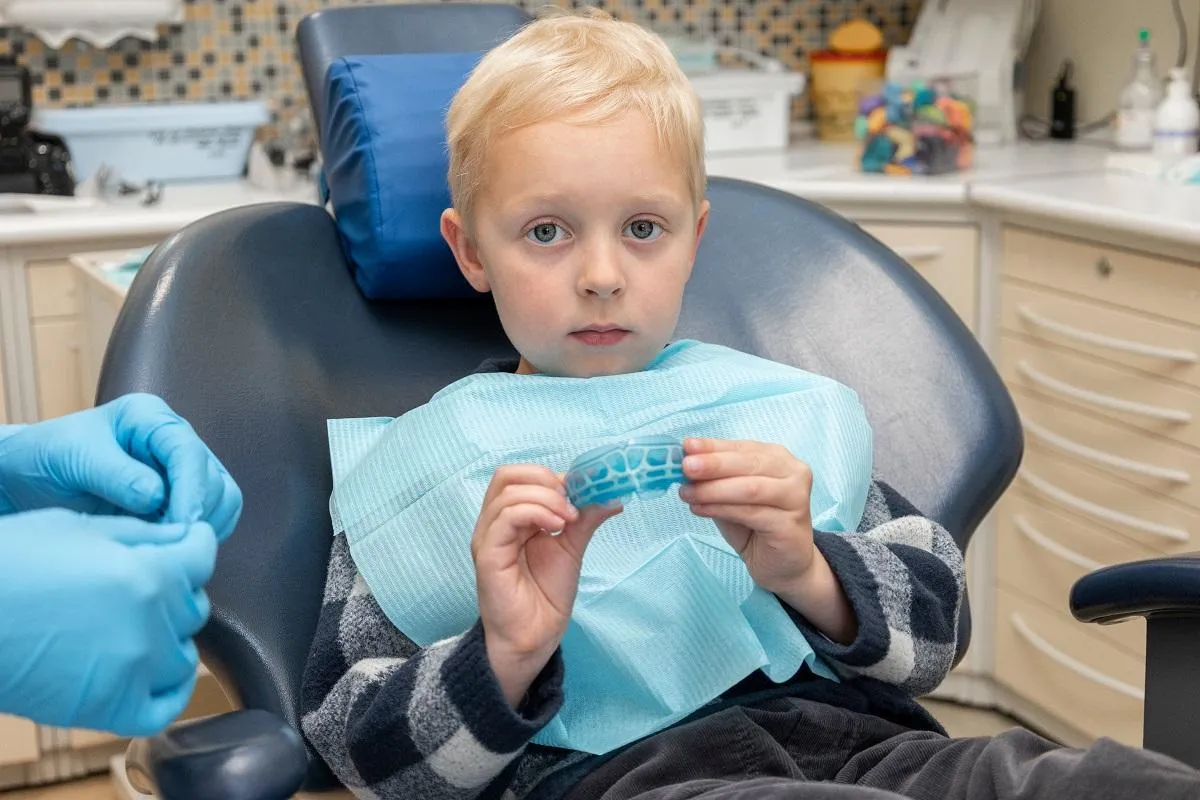
Read All About It
Dental Related Articles


Mouthguards For Sports: Protect Your Kids' Teeth
Sports mouthguards are essential protective gear for all athletes, especially kids. They can help to prevent a variety of dental emergencies.
Why kids need mouthguards
Kids need to wear mouthguards for sports because they protect them from a wide range of oral injuries, including:
Chipped or broken teeth
Knocked-out teeth
Lacerations to the gums and oral tissue
Damage to the tongue, lips, and cheeks
Fractured jawbone
Dental injuries are the most common type of orofacial injury sustained during sports participation, and children are especially at risk. According to the American Dental Association (ADA), more than 200,000 oral injuries are prevented each year by wearing a mouthguard. The ADA states that sports-related dental injuries account for more than 3 million emergency room visits each year. Of these, nearly 20% are sustained by children under the age of 15.
Mouthguards work by absorbing and distributing the force of a blow to the face. This can help to prevent the teeth from being knocked out or broken, and it can also reduce the risk of other serious injuries, such as concussions.
Mouthguards are especially important for children who participate in contact sports, such as football, hockey, and lacrosse. However, they are also recommended for children who participate in non-contact sports, such as basketball and baseball. This is because even in non-contact sports, there is a risk of collisions and falls.
Kids are at high risk for dental injuries during sports because their teeth are still developing and their jaws are not fully grown. They are also more likely to participate in sports that involve contact with other players or objects.

Benefits of wearing a mouthguard
Parents should make sure that their children wear a mouthguard whenever they participate in sports. This is one of the best ways to protect their children from oral injuries.
Here are some additional benefits of wearing a mouthguard:
Mouthguards can help to improve athletic performance by reducing muscle tension and fatigue in the jaw.
Mouthguards can help to protect the brain from concussions.
Mouthguards can help to reduce pain and swelling after a facial injury.
Types of mouthguards
There are three main types of mouthguards:
Stock mouthguards are pre-made and come in a variety of sizes. They are the least expensive option, but they can be bulky and uncomfortable to wear.
Boil-and-bite mouthguards are also pre-made, but they can be softened in hot water and molded to the wearer's teeth. This makes them a more comfortable fit than stock mouthguards, but they may not be as durable.
Custom-fitted mouthguards are made by a dentist and are the most expensive option, but they also offer the best protection. They are molded to the wearer's individual teeth, so they are comfortable to wear and do not interfere with breathing or speaking. Custom mouthguards also fit better and provide more protection.
Which type of mouthguard is right for your child?
The best type of mouthguard for your child will depend on their individual needs and budget. If your child is only participating in recreational sports, a stock or boil-and-bite mouthguard may be sufficient. However, if your child is participating in competitive sports or sports that involve high-risk activities, such as football, hockey, or lacrosse, a custom-fitted mouthguard is the best option.

Choosing and using a mouthguard
How to choose a mouthguard
When choosing a mouthguard for your child, look for one that has the ADA seal of acceptance. This means that the mouthguard has been tested and meets the ADA's standards for protection.
For kids' sports, it is important to choose a mouthguard that is comfortable and fits well. A good mouthguard should:
Fit snugly but not too tightly.
Allow for normal breathing and speaking.
Stay in place during activity.
Cover all of the teeth, including the upper and lower molars.
If your child has braces or other dental appliances, you will need to choose a mouthguard that is designed to work with those appliances.
How to use a mouthguard
Mouthguards should be worn whenever your child is participating in sports. Follow these guidelines to ensure proper use:
Wash the mouthguard with soap and water before and after each use.
Inspect the mouthguard for any tears or cracks. If it is damaged, replace it.
Place the mouthguard in the mouth and bite down firmly.
Adjust the mouthguard so that it is comfortable and fits snugly.
Wear the mouthguard during all sports activities.
Custom-fitted mouthguards should be replaced every year, or more often if they show signs of wear and tear.

Tips for getting your child to wear a mouthguard
Some kids may resist wearing a mouthguard because they find it uncomfortable or bulky. Here are some tips for getting your child to wear a sports mouthguard:
Start early. The earlier you get your child used to wearing a mouthguard, the more likely they are to continue wearing it as they get older. Introduce the mouthguard to your child as a fun and important part of their sports gear.
Let your child choose their own mouthguard. There are many different styles and colors of mouthguards available, so let your child choose one that they like. This will make them more likely to want to wear it.
Make sure the mouthguard fits properly. A well-fitting mouthguard will be comfortable and will not restrict your child's breathing or speech. If the mouthguard is too big or too small, it will be uncomfortable and your child is less likely to wear it or possibly even lose it.
Have your child practice wearing the mouthguard. Before your child's first game or practice, have them practice wearing the mouthguard for short periods of time. This will help them get used to the feeling of the mouthguard and make it more comfortable to wear during sports activities.
Make it a rule. Establish a rule that your child must wear their mouthguard whenever they participate in sports. Be a good role model and wear your own mouthguard if you play sports.
Praise your child for wearing their mouthguard. When your child wears their mouthguard, be sure to praise them for being responsible and safe. This will help them feel good about wearing their mouthguard and encourage them to continue wearing it.
Additionally, talk to your child about the importance of wearing a mouthguard. Explain that a mouthguard can protect their teeth, gums, and jaw from injury.
If your child is having trouble wearing their mouthguard, talk to their dentist. They may be able to offer suggestions or fit them with a custom-made mouthguard.
By following these tips, you can help your child develop a good habit of wearing a mouthguard and protect their smile.
Conclusion
Mouthguards are an essential piece of safety gear for all athletes, especially kids. By wearing a mouthguard, kids can protect their teeth and gums from injury. Parents can help by choosing the right type of mouthguard for their child and making sure that it fits well.
If you have any questions and would like to discuss details about dental mouthguards for your child, request an appointment with Dr. Joby Hurst.

19 INVERNESS CENTER PARKWAY, STE 250, BIRMINGHAM, AL 35242
TEL: 205.969.7454
E-MAIL: INFO@HURSTPEDIATRICDENTAL.COM
2018 © ALL RIGHTS RESERVED | PRIVACY POLICY | TERMS AND CONDITIONS
Site by Trustway Marketing Powered by Kyrios Systems